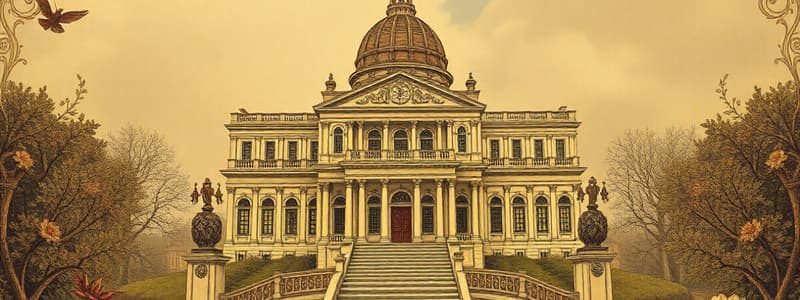Podcast
Questions and Answers
Which branch of government is considered the most dangerous due to its control over financial resources?
Which branch of government is considered the most dangerous due to its control over financial resources?
- Administrative
- Legislative
- Judicial
- Executive (correct)
What concept does the Separation of Powers primarily aim to prevent?
What concept does the Separation of Powers primarily aim to prevent?
- Centrally controlled finance
- Interbranch collaboration
- Excessive power by one individual or group (correct)
- Democratic governance
What term describes the situation when government branches disagree and block each other's actions?
What term describes the situation when government branches disagree and block each other's actions?
- Collaboration
- Cooperation
- Gridlock (correct)
- Compromise
According to Montesquieu, what must be done to prevent tyranny?
According to Montesquieu, what must be done to prevent tyranny?
What governmental system did Turkey transition to that weakened constitutional checks and balances?
What governmental system did Turkey transition to that weakened constitutional checks and balances?
What foundational idea underpins the concept of Separation of Powers?
What foundational idea underpins the concept of Separation of Powers?
Who is credited with the well-known version of the Doctrine of Separation of Powers?
Who is credited with the well-known version of the Doctrine of Separation of Powers?
Which of the following is not one of the three branches of government mentioned in the concept of Separation of Powers?
Which of the following is not one of the three branches of government mentioned in the concept of Separation of Powers?
What does Section 3 of the HRA 1998 preserve?
What does Section 3 of the HRA 1998 preserve?
What significant change did the Constitutional Reform Act of 2005 bring regarding the Lord Chancellor?
What significant change did the Constitutional Reform Act of 2005 bring regarding the Lord Chancellor?
How did the role of the Supreme Court differ from that of the Law Lords in the House of Lords before the reform?
How did the role of the Supreme Court differ from that of the Law Lords in the House of Lords before the reform?
What aspect of the Lord Chancellor's role was often criticized as being contradictory?
What aspect of the Lord Chancellor's role was often criticized as being contradictory?
What provision in the HRA restricts the interpretive powers of the courts?
What provision in the HRA restricts the interpretive powers of the courts?
What is one key change brought about by the reform concerning the Supreme Court justices?
What is one key change brought about by the reform concerning the Supreme Court justices?
How does the concept of checks and balances apply to the role of the executive in relation to Parliament?
How does the concept of checks and balances apply to the role of the executive in relation to Parliament?
What does Section 6 of the HRA state about public bodies?
What does Section 6 of the HRA state about public bodies?
Why was there resistance to reforming the role of the Lord Chancellor?
Why was there resistance to reforming the role of the Lord Chancellor?
In the context of the reforms, how has public confidence in the separation of powers been addressed?
In the context of the reforms, how has public confidence in the separation of powers been addressed?
What was Montesquieu's preferred form of executive government?
What was Montesquieu's preferred form of executive government?
Which characteristic of the doctrine of separation of powers emphasizes that one branch should not take on the responsibilities of another?
Which characteristic of the doctrine of separation of powers emphasizes that one branch should not take on the responsibilities of another?
In the context of the separation of powers, what is the primary role of the judiciary?
In the context of the separation of powers, what is the primary role of the judiciary?
What does 'checks and balances' refer to in the separation of powers?
What does 'checks and balances' refer to in the separation of powers?
How does the separation of powers in the UK differ from that in the USA?
How does the separation of powers in the UK differ from that in the USA?
Which case emphasized the principle of separation between the legislature and the judiciary?
Which case emphasized the principle of separation between the legislature and the judiciary?
What is a major concern regarding the balance of powers in the UK?
What is a major concern regarding the balance of powers in the UK?
What significant power do judges possess despite the principle of separation of powers?
What significant power do judges possess despite the principle of separation of powers?
Which inquiry examined the UK government's decision-making during the Iraq War?
Which inquiry examined the UK government's decision-making during the Iraq War?
What is the concern with the overlap of powers in the UK judiciary and Parliament?
What is the concern with the overlap of powers in the UK judiciary and Parliament?
What aspect of the doctrine of separation of powers is crucial for maintaining democracy?
What aspect of the doctrine of separation of powers is crucial for maintaining democracy?
Which legal principle limits judicial review of certain executive actions?
Which legal principle limits judicial review of certain executive actions?
What relationship exists between the Parliament and the judiciary in the UK?
What relationship exists between the Parliament and the judiciary in the UK?
Which of the following best describes the concept of 'margin of appreciation'?
Which of the following best describes the concept of 'margin of appreciation'?
Flashcards
Separation of Powers (SoP)
Separation of Powers (SoP)
The principle of dividing governmental power among different branches to prevent any one person or group from holding too much power.
Executive Branch
Executive Branch
The branch responsible for executing and enforcing laws.
Legislative Branch
Legislative Branch
The branch responsible for making laws.
Judicial Branch
Judicial Branch
Signup and view all the flashcards
Checks and Balances
Checks and Balances
Signup and view all the flashcards
Gridlock
Gridlock
Signup and view all the flashcards
Tyranny
Tyranny
Signup and view all the flashcards
Montesquieu's Doctrine of SoP
Montesquieu's Doctrine of SoP
Signup and view all the flashcards
Parliamentary Supremacy (HRA)
Parliamentary Supremacy (HRA)
Signup and view all the flashcards
Declaration of Incompatibility (HRA)
Declaration of Incompatibility (HRA)
Signup and view all the flashcards
Public Bodies (HRA)
Public Bodies (HRA)
Signup and view all the flashcards
Lord Chancellor's Role (Pre-Reform)
Lord Chancellor's Role (Pre-Reform)
Signup and view all the flashcards
Lord Chancellor Reform
Lord Chancellor Reform
Signup and view all the flashcards
Supreme Court Reform
Supreme Court Reform
Signup and view all the flashcards
Public Confusion (Supreme Court)
Public Confusion (Supreme Court)
Signup and view all the flashcards
Checks and Balances (Executive-Parliament)
Checks and Balances (Executive-Parliament)
Signup and view all the flashcards
Judicial Review (Executive)
Judicial Review (Executive)
Signup and view all the flashcards
Courts and Parliament
Courts and Parliament
Signup and view all the flashcards
Overlap in UK SoP
Overlap in UK SoP
Signup and view all the flashcards
Least Dangerous Branch
Least Dangerous Branch
Signup and view all the flashcards
Judges as Interpreters and Lawmakers
Judges as Interpreters and Lawmakers
Signup and view all the flashcards
Judicial Independence from Parliament
Judicial Independence from Parliament
Signup and view all the flashcards
Ex parte Smedly (1985)
Ex parte Smedly (1985)
Signup and view all the flashcards
Overlap in Lawmaking
Overlap in Lawmaking
Signup and view all the flashcards
Common Law Development
Common Law Development
Signup and view all the flashcards
Judicial Review of Executive Actions
Judicial Review of Executive Actions
Signup and view all the flashcards
Limits on Judicial Review
Limits on Judicial Review
Signup and view all the flashcards
Judicial Inquiries into Executive Actions
Judicial Inquiries into Executive Actions
Signup and view all the flashcards
Chilcot Inquiry
Chilcot Inquiry
Signup and view all the flashcards
Study Notes
Separation of Powers (SoP)
- The core principle of SoP is that governmental power should be divided among distinct branches to prevent any single entity from accumulating excessive power.
- Three branches: Executive, Judicial, and Legislative.
- Each branch needs cooperation from the others, forming a system of checks and balances.
- Gridlock can occur if branches disagree and block each other's actions (stalemate).
- A strong executive (e.g., PM, Ministers, civil servants) often holds significant power, including financial resources (taxes).
- A lack of SoP can be seen as a sign of potential dictatorship (e.g., Turkey).
SoP and Montesquieu
- Montesquieu, a French nobleman, established a well-known version of SoP, proposing that power should be checked by power to avoid tyranny.
- He saw a monarchy as a stable executive, promoting continuity.
- Montesquieu emphasized the danger of individuals holding multiple branch powers.
- His work, The Spirit of the Laws, is a crucial text for understanding this system.
Aspects and Characteristics of the SoP
- Functional Separation: Each branch should perform only its assigned functions, avoiding overlap.
- Personnel Separation: Individuals should not belong to more than one branch, though overlap occurs in practice.
- Checks and Balances: One branch can scrutinize and hold another accountable.
SoP in the UK
- The UK's SoP is not complete; overlaps, especially between executive and legislative branches, exist.
- Ministers need to be MPs.
- The key question is whether the UK has a sufficient SoP to prevent abuse of power.
- The UK has a less significant SoP than some other countries.
Constitutional Relationships and Overlaps
- The relationships between branches involve overlaps in areas like lawmaking.
- Examples include Legislature & Judiciary, Executive & Legislature, and Executive & Judiciary, analyzed in relation to the UK's functioning.
SoP and the Judiciary
- The judiciary is the least dangerous branch due to its passivity and reliance on others for cases.
- Judges must be independent to ensure fairness and enforce the rule of law.
- Judges create precedent despite not being exclusively responsible for lawmaking, needing parliament's laws.
- Tension exists between a judge's role as an interpreter of law and their lawmaking through precedent.
Relationships between Branches (Parliament and Judiciary)
- Conflicts can arise between Parliament and the judiciary.
- Examples including Shaw v DPP, R v Brown, Hamilton v Al Fayed highlight these conflicts. Issues such as ouster clauses and parliamentary privilege can create friction.
- Both make laws (lack of functional separation), with Parliament's authority being absolute in relation to the court system.
Relationships between Branches (Executive and Judiciary)
- Executive and Judiciary also show overlapping functions and powers that overlap, primarily from the executive being able to make judgements.
- Ex parte Fire Brigades Union, Abbassi, and R (CND) v Prime Minister demonstrate the division of power in this branch.
- Judicial review can check executive decisions, but key prerogative powers (e.g., treaty making, defense) often aren't reviewed.
Judicial/Public Inquiries
- Public inquiries (e.g., Chilcot, Hutton) scrutinize actions of the executive, examining decision-making processes.
Human Rights Act (1998)
- The HRA (1998) impacts the SoP, particularly with respect to judicial interpretations and parliament's supreme authority.
- Section 3 preserves parliamentary supremacy.
- Section 4 restricts judicial interpretative powers.
- Section 6 expands judicial review scope.
Constitutional Reform (2005)
- The Constitutional Reform Act (2005) reformed the Lord Chancellor's role and created the Supreme Court.
- The Lord Chancellor was a prominent example of SoP violations; held multiple positions simultaneously. This reform greatly reduced the overlap in this position.
- Now the Lord Chancellor is a normal minister.
Supreme Court
- Established to reduce the overlaps between the judiciary and legislature.
- The Supreme Court replaced the Law Lords, significantly improving SoP by separating the judicial and political branches of the UK government.
Checks and Balances: Continued
- The executive is advised by the PM to dissolve Parliament.
- Executive must resign if losing parliamentary support.
- Executive makes judicial appointments.
- Executive decisions and functions may be scrutinised by the court system.
- Courts, through rule of law, check Parliament (statutory interpretation).
Studying That Suits You
Use AI to generate personalized quizzes and flashcards to suit your learning preferences.




